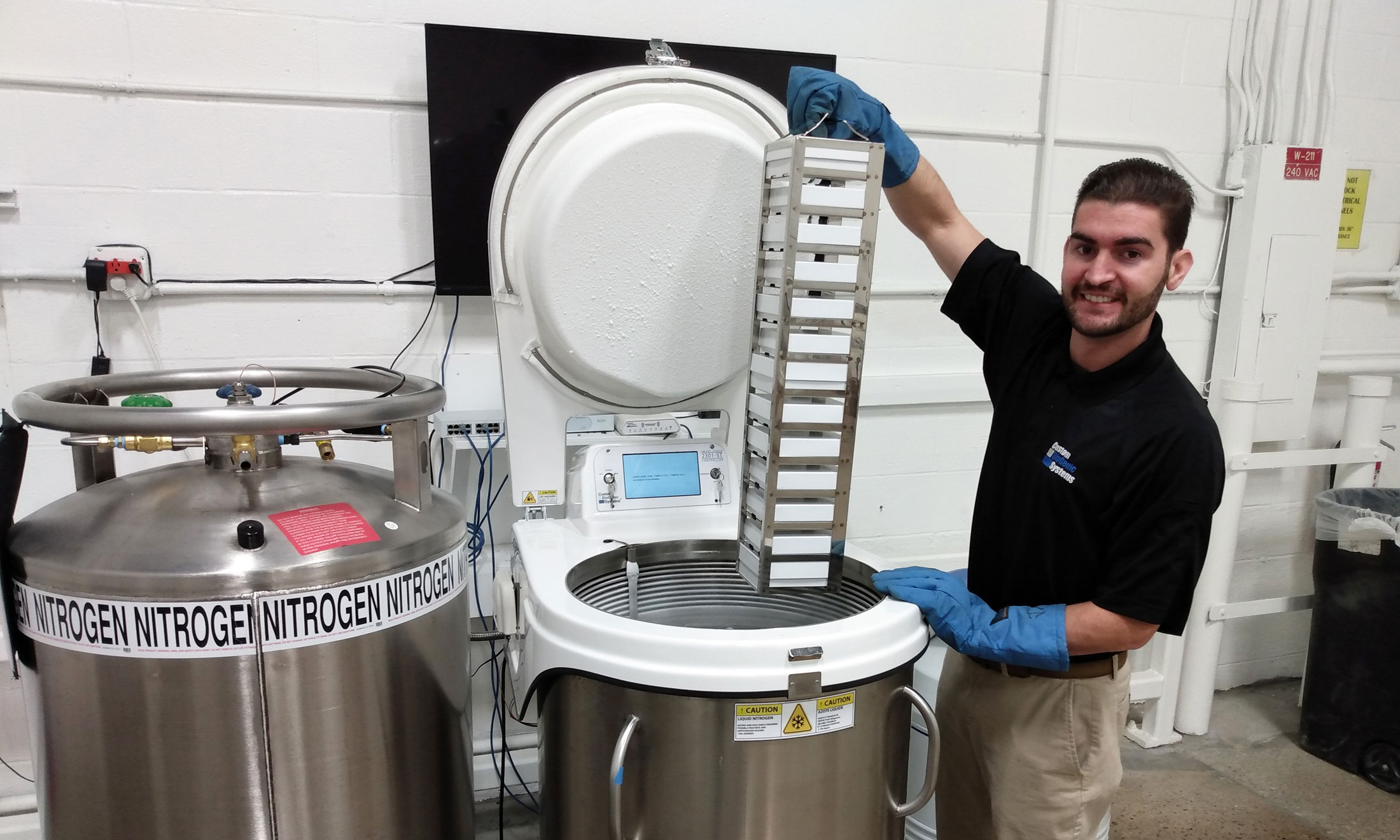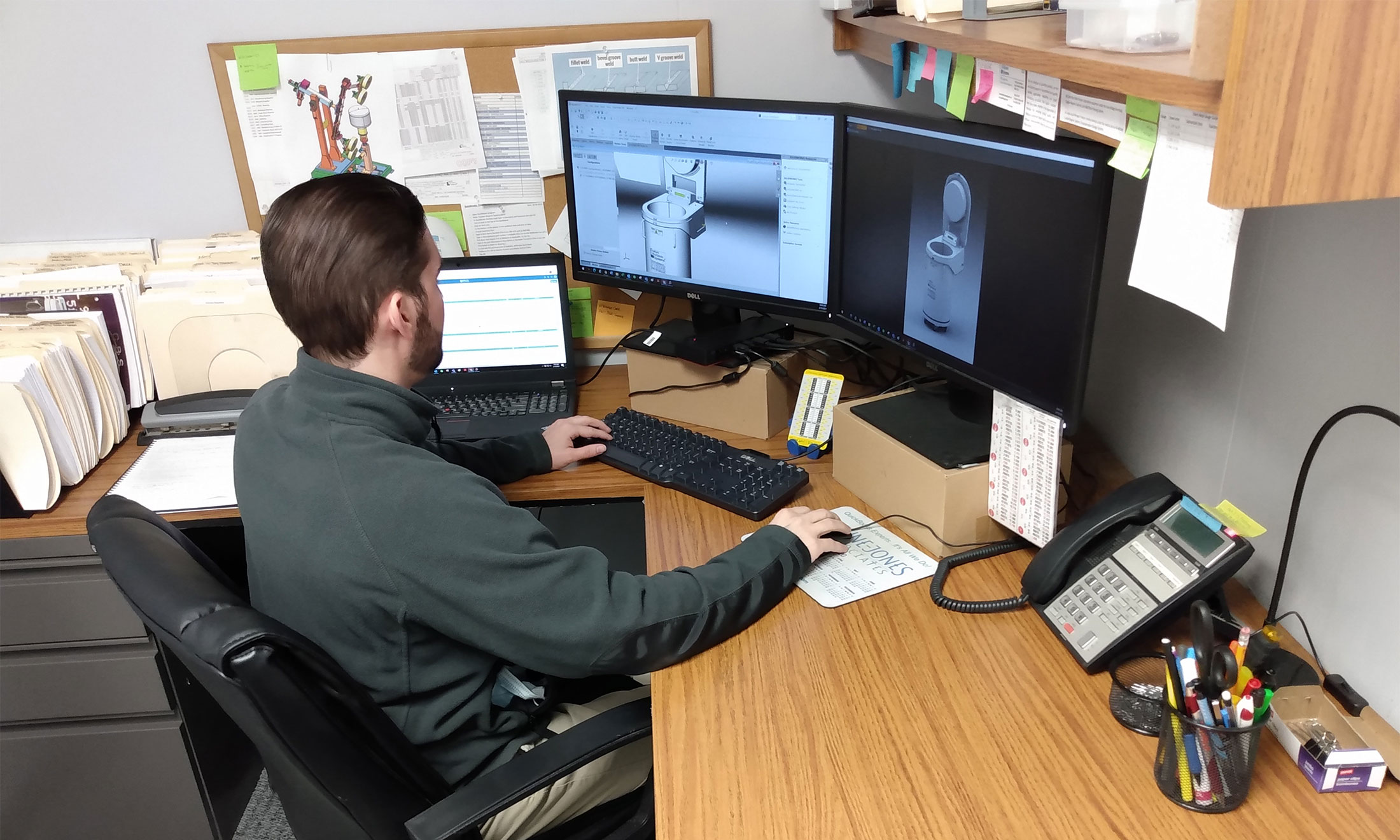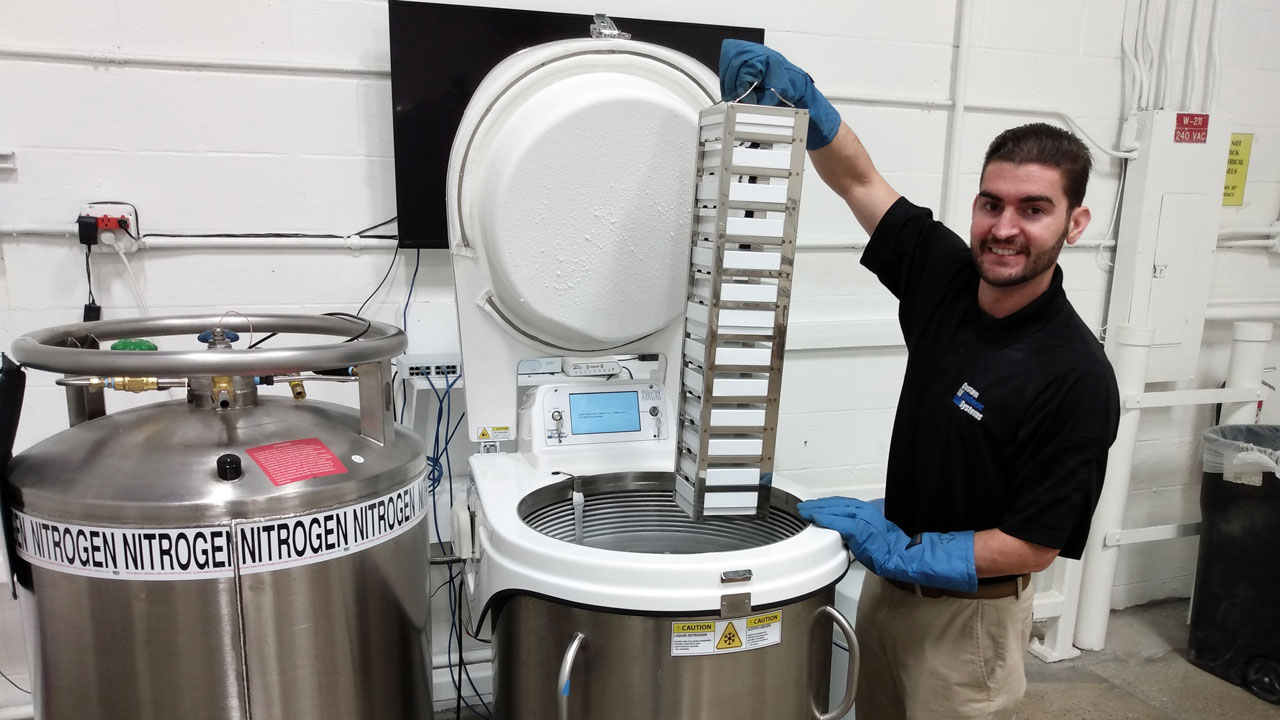- YouTube
- TikTok
First recipient of OU’s Frontline Workers Scholarship eyes future as a cryogenic engineer
David McCallum’s work at a cryogenic storage company has taken on new meaning in the midst of the coronavirus pandemic

David McCallum, the first recipient of OU's Frontline Workers Scholarship, works at Custom Biogenic Systems, a company that manufactures equipment to transport and store biological samples like vaccines.

McCallum uses Computer Aided Design software to design cryogenic storage equipment.

Since June 2018, David McCallum has worked for Custom Biogenic Systems, where the main mission is keeping things cold – freezing cold. The company serves an array of clients whose work depends on state-of-the-art cryogenic equipment. They include pharmaceutical and biotech firms developing vaccines. At his job, McCallum uses computer software to design equipment that allows for safe storage and transport of these and other climate-sensitive materials.
“Anything we manufacture we first design with CAD software and see how it’s going to work,” said McCallum, who has a certificate in Computer Aided Design from Macomb Community College. “We’ll also run some mathematical calculations to see if any problems arise.”
Along with his CAD background, McCallum is nearing completion of an associate degree in mathematics, also from Macomb. He plans to transfer to OU this summer to pursue a bachelor’s degree in mechanical engineering, a credential he hopes to parlay into an engineering role with the company.
“When our team is developing products that will preserve things like vaccines and biological samples, we have to understand the principles of heat transfer and how different variables are going to affect (liquid nitrogen) evaporation rates,” he said. “We also have to think about the assembly process and how we’re going to fit things together. These types of issues are at the heart of mechanical engineering.”
Scholarship support
When Michigan’s “Futures for Frontliners” initiative was announced, McCallum applied and was approved for the program. However, he realized that since he was on the cusp of completing his associate degree, the program would be of limited benefit to him. He had researched options for transferring to a four-year school, and OU was on his shortlist, he said, due in large part to scholarship opportunities. Then he found out about OU’s Frontline Workers Scholarship.
“My sister heard about it on the news and told me about it,” he said. He applied and learned soon after that he was the first student to be approved for the scholarship. The program provides $1,250 per year for two years to Michigan frontline workers who earn their associate degree from any of the state’s 28 community colleges and transfer to Oakland University between summer 2021 and fall 2024.
“In these difficult days of the pandemic, we want to extend funding support and appreciation to the extraordinary efforts of frontline workers,” said Oakland University President Ora Hirsch Pescovitz, when OU announced the program in January. “We hope these scholarships provide vital financial support as they pursue their educational ambition.”
“I’m really grateful,” McCallum said about receiving the scholarship. “I looked at a lot of different colleges, and one of the things I was looking for was scholarships for students who are transferring a lot of credits. I was also approved for OU’s Presidential Transfer Award, so receiving the Frontline Workers Scholarship made things even better for me.”
A winding road
McCallum’s grateful outlook is rooted in the challenges he’s overcome along a circuitous path to higher education. The 30-year-old Sterling Heights resident is nearly four years into recovery from a lengthy battle with alcohol and prescription opioid abuse that started in his adolescence, altering the trajectory of his early adult years.
His addiction caused him to drop out of high school and he worked various jobs, including at a gas station, a gym and a restaurant, to make ends meet. He was in and out of treatment facilities for several years before regaining control of his life with the support of 12-step meetings and Families Against Narcotics, a community-based program for those seeking recovery, those in recovery and family members affected by addiction.
“It took a long time for me to wake up and want something better for myself,” he reflected. “I’ve had a lot of good mentors along the way who have encouraged me, especially when it comes to education.”
McCallum eventually obtained a GED and later enrolled at Macomb Community College where he earned his certificate in Computer Aided Design. That led to a few entry-level manufacturing jobs and paved the way to his current position at Custom Biogenic Systems. His work took on an added sense of urgency when the pandemic took hold around the world.
“When the pandemic first hit, we were working a lot of overtime and some of the equipment we were making was going to facilities that do vaccine research,” said McCallum. “One of the biggest obstacles that some of these vaccines have is that they need to be stored and transported at extremely cold temperatures. We knew we had to figure things out, because a lot of people are going to need this equipment.”
Finding his way
McCallum has grown adept at figuring things out as he’s pursued his educational goals with focus and determination. He’s currently taking classes at Macomb and Oakland Community College and is a guest student at Oakland University, getting a jump-start on his engineering requirements. He said the pandemic, for all its disruption, has allowed him to ramp up his academic pursuits.
“With everything going online, I’ve been able to take courses at all three schools,” he said. “Scheduling has been a bit crazy, but I think I’ll be able to graduate sooner.”
Finding a program that would allow him to work full time while going to school was a “major factor” in his decision to transfer to OU, he said.
“I checked out some other schools that pretty much told me it would be impossible to complete their engineering program while working full time,” he said. “I didn’t get that impression at all when I talked to Derek (Moreno), one of the engineering academic advisers at OU. I met with him multiple times when I was going to Macomb, and he basically said ‘I understand your situation. We have a number of students working full time, and it’s possible that you could continue to work full time and we should be able to accommodate an engineering path for you.’”
McCallum also credits his boss at Custom Biogenic Systems for giving him the confidence to pursue an engineering degree.
“My boss thought it was something I was definitely capable of and really encouraged me,” he shared. “The whole company has been very accepting and supportive of my entire journey.”
As he progresses toward his goals, McCallum said he looks forward to continuing his work to help others as he has been helped.
“Knowing that our work is contributing to society at such a critical moment is really rewarding,” he said. “I can’t think of anything more interesting than helping design medical equipment that will play a part in protecting people’s lives.”
To learn more about OU’s Frontline Workers Scholarship, visit the web page.


 February 23, 2021
February 23, 2021